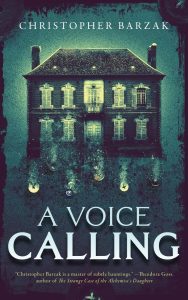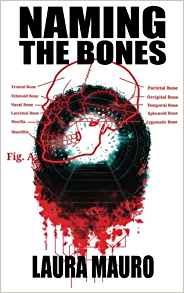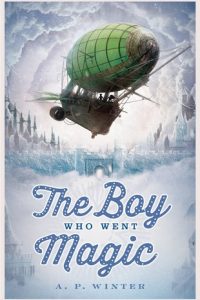Gary K. Wolfe Reviews A Voice Calling by Christopher Barzak
 A Voice Calling, Christopher Barzak (Psychopomp 979-8-89116-001-9, $13.99, 108pp, tp) March 2024.
A Voice Calling, Christopher Barzak (Psychopomp 979-8-89116-001-9, $13.99, 108pp, tp) March 2024.
There has been no shortage of good haunted-house tales in the past year or so, with contributions from Elizabeth Hand, Alix E. Harrow, T. Kingfisher, and others. Christopher Barzak’s A Voice Calling (his first novella, he tells us in an afterword) might seem to be hopping on the bandwagon, but in fact it’s an expansion of a 2007 story that was included in his 2013 Shirley Jackson Award-winning collection Before and Afterlives. Jackson also provides the epigraph for the novella, but the distinctive first-person plural narrative voice is very much Barzak’s own, despite some echoes not only of Jackson but of Faulkner at his most Southern Gothic in ‘‘A Rose for Emily’’ (Barzak seems to be carving out his own version of what might be called Ohio Gothic). That plural narrator–what John Gardner once called the ‘‘town POV’’ – is the collective voice of the community as it witnesses the disturbing fates of a series of families who occupy a local mansion over more than a century. Through 15 very short chapters which skip around in chronology, Barzak incrementally builds a sense of mounting dread, as the voice itself shifts from the curious to the bemused, and finally to the outraged.
The first family to occupy the house died or disappeared so long ago that no one in town even remembers their name; they’re simply referred to as the Blanks. After 1900, the Olivers, viewed by the townspeople as ‘‘a bad lot’’ given to ‘‘unwholesome activities,’’ moved in and mostly met violent ends. The bulk of the tale, however, concerns the Addleson family, who lived in the house for nearly eight decades, earning it the nickname Button House after the father inherited a fortune from his grandfather’s WWII-era button factory. The current Addlesons are Jonas, a rather directionless alcoholic, and Rose, who seems more attuned to the house than anyone else; she’s heard voices since childhood, and at one point tells her mother that ‘‘the house doesn’t change. It’s always been this way. It’s the way it wants to stay.’’ (The house’s own malignant will seems to have become a staple of haunting tales ever since Shirley Jackson.)
The bulk of this part of the narrative, though – by far the longest addition to Barzak’s original story, making up over a third of the novella – concerns Jonas’s grandfather during the 1940s, and specifically what happens with one of his factory workers named Bernadette Winterson. It’s a harrowing tale, and one that reflects Barzak’s ongoing concern with worker exploitation and class privilege, though it also strains the limits of that collective-narration technique. By taking us away from the house and the community for the first time and reporting detailed scenes and dialogue that the townspeople have no reasonable way of learning, it almost undermines the claustrophobic sense of entrapment that the rest of the tale has been carefully building. Almost – but not quite. Barzak’s clear and elegant prose, his skill at sketching believable and sympathetic characters with a few deft strokes, and his evocative sense of place, are as strong as ever – and we should probably take to heart his point that what cursed houses allegedly do to folks is nothing compared to what they actually do to each other.
Gary K. Wolfe is Emeritus Professor of Humanities at Roosevelt University and a reviewer for Locus magazine since 1991. His reviews have been collected in Soundings (BSFA Award 2006; Hugo nominee), Bearings (Hugo nominee 2011), and Sightings (2011), and his Evaporating Genres: Essays on Fantastic Literature (Wesleyan) received the Locus Award in 2012. Earlier books include The Known and the Unknown: The Iconography of Science Fiction (Eaton Award, 1981), Harlan Ellison: The Edge of Forever (with Ellen Weil, 2002), and David Lindsay (1982). For the Library of America, he edited American Science Fiction: Nine Classic Novels of the 1950s in 2012, and a similar set for the 1960s. He has received the Pilgrim Award from the Science Fiction Research Association, the Distinguished Scholarship Award from the International Association for the Fantastic in the Arts, and a Special World Fantasy Award for criticism. His 24-lecture series How Great Science Fiction Works appeared from The Great Courses in 2016. He has received six Hugo nominations, two for his reviews collections and four for The Coode Street Podcast, which he has co-hosted with Jonathan Strahan for more than 300 episodes. He lives in Chicago.
This review and more like it in the July 2024 issue of Locus.
 While you are here, please take a moment to support Locus with a one-time or recurring donation. We rely on reader donations to keep the magazine and site going, and would like to keep the site paywall free, but WE NEED YOUR FINANCIAL SUPPORT to continue quality coverage of the science fiction and fantasy field.
While you are here, please take a moment to support Locus with a one-time or recurring donation. We rely on reader donations to keep the magazine and site going, and would like to keep the site paywall free, but WE NEED YOUR FINANCIAL SUPPORT to continue quality coverage of the science fiction and fantasy field.
©Locus Magazine. Copyrighted material may not be republished without permission of LSFF.







